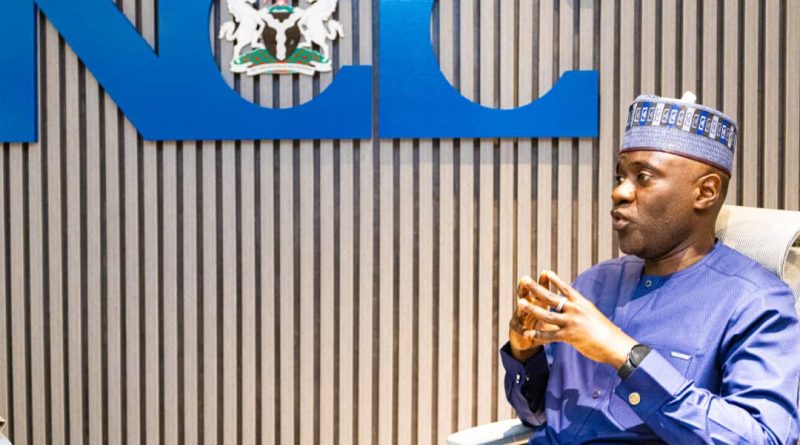NCC records over 19,000 fibre cuts in 8 months – Maida
…unveils new tools to boost broadband expansion
The Nigerian Communications Commission (NCC) reported that Nigeria experienced 19,384 fibre optic cable cuts between January and August 2025.
Aminu Maida, Executive Vice Chairman (EVC) of the NCC, disclosed during the Business Roundtable on Broadband Investment and Infrastructure Protection on Wednesday in Abuja.
Maida also revealed that within the same period, there were over 3,200 cases of telecom equipment theft and more than 19,000 instances where telecom operators were denied access to their sites.
Highlighting the risks of ongoing damage to telecom infrastructure, Maida explained that vandalism and fibre cuts disrupt digital services across sectors such as commerce, healthcare, and security.
“These interruptions slow services, reduce productivity, limit access to opportunities, and, in some cases, endanger lives,” he said.
With over 140 million internet users and a national broadband penetration rate of 48.81%, Maida stressed that broadband connectivity is no longer just a technical issue but a development priority.
He cited research indicating that a 10% increase in broadband penetration can lead to a 1.38% increase in GDP for developing countries, highlighting the losses Nigeria risks if its digital infrastructure remains vulnerable.
Maida acknowledged the June 2024 Presidential Order designating telecom infrastructure as Critical National Information Infrastructure (CNII), which gives security agencies greater authority to tackle vandalism.
Despite this, attacks on telecom facilities continue, causing service disruptions and raising operational costs.
He called for stricter protection measures, stronger enforcement, and better collaboration across government levels to safeguard telecom assets.
Addressing the inconsistent application of Right of Way (RoW) fees across states, Maida noted that while the Nigerian Governors Forum agreed on a uniform fee of N145 per metre to facilitate broadband rollout, only 11 states have fully waived these charges. Other states still impose higher fees or lack clear policies, hindering network expansion.
Read also: FRC calls for integrity-driven reforms to strengthen Nigeria’s financial system
He urged state governments to adopt the agreed rate or waive the fees entirely, saying this would speed up the rollout of the 90,000-kilometre fibre network outlined in Nigeria’s National Broadband Plan (2020–2025).
To improve transparency and streamline infrastructure deployment, Maida announced two new initiatives aimed at speeding up telecom infrastructure development nationwide: the Ease of Doing Business Portal and the Nigeria Digital Connectivity Index (NDCI).
Both tools address challenges in the sector.
The Ease of Doing Business Portal is a digital platform designed to simplify the permit and approval process for telecom infrastructure projects. It allows operators to submit, track, and manage applications in a centralized system, reducing delays and inconsistencies between states.
Maida said the portal would promote uniformity and eliminate bottlenecks that have slowed broadband expansion.
The Nigeria Digital Connectivity Index (NDCI) is a benchmarking framework that will assess and rank states based on digital infrastructure, broadband coverage, policy environment, and digital inclusion.
The index aims to identify gaps, encourage competition among states, and guide investment and policy decisions.
These initiatives target two major issues: slow and inconsistent approval processes across states, and the lack of reliable, comparable data on digital progress nationwide.
Despite the national agreement on a uniform RoW rate of N145 per metre, many states still impose high fees or lack clear frameworks, with only 11 states implementing the agreed rate so far.
Maida revealed that telecom operators have committed over $1 billion in new broadband investments, driven by recent regulatory reforms and growing investor confidence.
He emphasized the importance of cooperation between federal and state governments to secure Nigeria’s digital infrastructure.
“Pipelines of oil are giving way to pipelines of fibre,” he said. “In today’s world, a community without digital connectivity is cut off from education, markets, and opportunity.”
As Nigeria aims to reach 70% broadband penetration by the end of 2025, the roundtable highlighted the need for sustained and unified action to protect and expand broadband infrastructure.
Wale Edun, minister of finance and coordinating minister of the economy, called on the private sector to increase investments in the telecom industry.
Edun, represented by Ali Mohammed, director at the ministry of finance, said the sector is vulnerable and compact. “We call on local and international investors to invest. Government alone cannot handle this challenge. We need private sector collaboration,” he said.
He acknowledged challenges including weak frameworks and excessive taxation but expressed confidence they could be addressed through stakeholder collaboration.
Abdulateef Shittu, director general of the Nigerian Governors Forum (NGF), and Abdulrahman Abdulrazaq, chairman of the NGF, reaffirmed the governors’ commitment to supporting Nigeria’s digital transformation.
“We fully support the national goal to raise broadband penetration to 80% by 2027. Achieving this will require an additional 95,000 kilometres of fibre-optic cable across Nigeria. It’s an ambitious target that demands collaboration among all stakeholders,” he said.
The event brought together government officials, industry leaders, and investors to discuss threats to broadband infrastructure and their implications for Nigeria’s digital economy.

